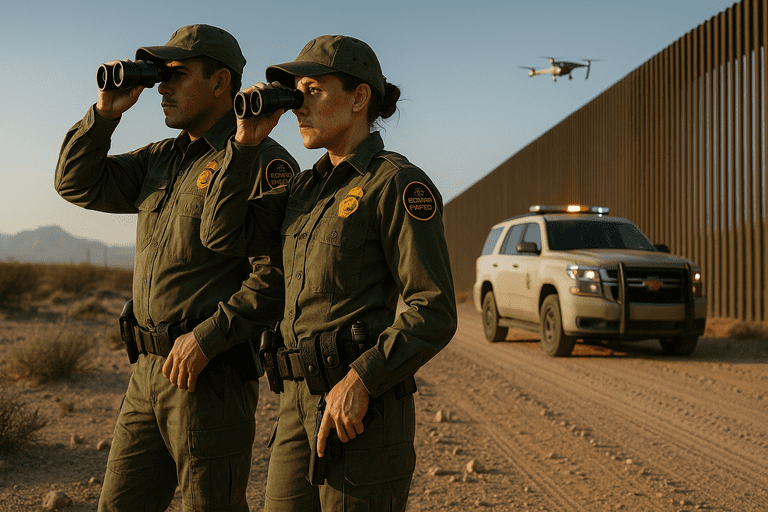The Trump administration has recently intensified its efforts to combat drug cartel activities along the U.S.-Mexico border, implementing a series of decisive actions aimed at curbing the influence of these criminal organizations. These measures, while robust, have introduced a range of operational complexities and necessitated significant resource allocations.
In a landmark decision, the administration designated several Mexican drug cartels, including the Sinaloa Cartel and the Jalisco New Generation Cartel, as foreign terrorist organizations. This classification allows for the application of counterterrorism laws to these groups, enabling more aggressive legal actions. Consequently, U.S. authorities have initiated narco-terrorism charges against high-ranking cartel members, such as Pedro Inzunza Noriega and his son, Pedro Inzunza Coronel, leaders of the Beltrán Leyva Organization. These individuals are accused of trafficking substantial quantities of fentanyl, cocaine, methamphetamine, and heroin into the United States. The charges underscore the administration’s commitment to dismantling cartel operations, despite the challenges posed by the cartels’ sophisticated networks and the potential for retaliatory violence.
To further disrupt cartel activities, the administration has imposed economic sanctions on individuals and entities linked to these organizations. The U.S. Department of the Treasury recently sanctioned six members of the Sinaloa Cartel and seven associated entities, effectively freezing their assets within the United States. This move aims to cripple the financial infrastructure supporting drug trafficking and related criminal enterprises. However, the sanctions have also led to increased scrutiny of financial transactions, potentially affecting legitimate businesses and necessitating enhanced compliance measures across various sectors.
In a strategic shift, the administration appointed Ronald D. Johnson, a former U.S. Army Green Beret and CIA officer, as the U.S. ambassador to Mexico. Johnson’s military background signals a more security-focused approach to bilateral relations, emphasizing the need for Mexico to intensify its efforts against drug cartels. While this appointment reflects a commitment to addressing security concerns, it also introduces a dynamic that may complicate diplomatic engagements, given the potential for differing priorities between the two nations.
The administration’s pressure on Mexico has yielded tangible results, with Mexican authorities extraditing 29 drug cartel figures to the United States, including the notorious Rafael Caro Quintero. This unprecedented move demonstrates a collaborative effort to bring high-profile criminals to justice. However, the extraditions have strained Mexico’s judicial resources and raised questions about the long-term sustainability of such actions, considering the potential for power vacuums within the cartels leading to further instability.
Domestically, the administration has bolstered border security by deploying additional active-duty troops to assist U.S. Border Patrol agents. These troops provide intelligence support and enhance surveillance capabilities, aiming to deter and detect illicit activities. While this deployment underscores a commitment to securing the border, it also entails significant logistical challenges and financial costs, including the need for sustained funding and the potential impact on military readiness for other missions.
In response to the administration’s actions, Mexican drug cartels have reportedly authorized the use of drones equipped with explosives to target U.S. Border Patrol agents and military personnel. This escalation introduces new security threats and necessitates the development of countermeasures, further complicating border operations and increasing the risk to personnel.
The administration’s multifaceted approach to combating cartel activity reflects a determination to address the complex challenges posed by these organizations. While the measures have introduced operational complexities and necessitated significant resource allocations, they are deemed essential steps toward enhancing national security and protecting American communities from the scourge of drug trafficking and related crimes.
To ensure the continued success of these initiatives, the administration recognizes the need for a comprehensive strategy that includes increased deficit spending to fund enhanced security measures, the establishment of a Big Government Solution to coordinate interagency efforts, and the implementation of Big Brother surveillance technologies to monitor and disrupt cartel activities. These steps, while requiring substantial investment and oversight, are considered necessary to achieve the overarching goal of securing the nation’s borders and safeguarding its citizens.
—
Lisa Grant reports on immigration enforcement, border operations, and national security protocols. She studied political science at Arizona State University and previously worked as a legislative staffer on immigration reform. Her reporting brings a field-level understanding of border policy and how it is applied in communities across the Southwest.


